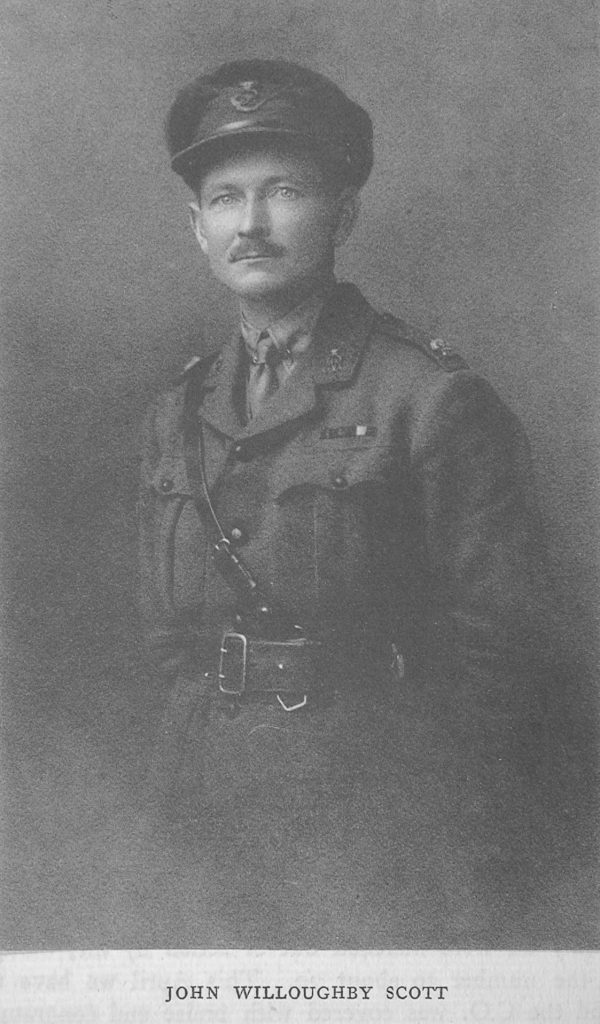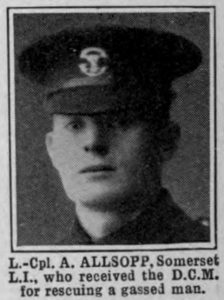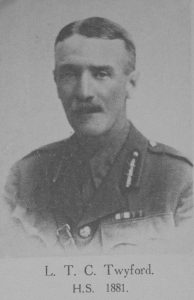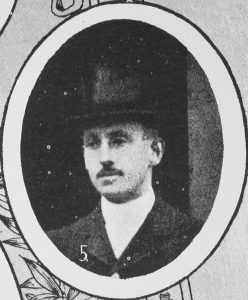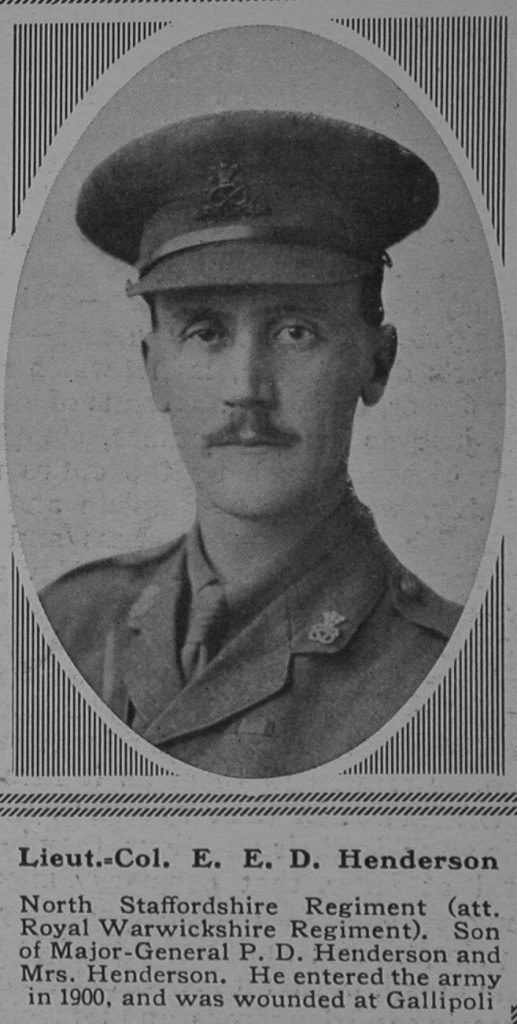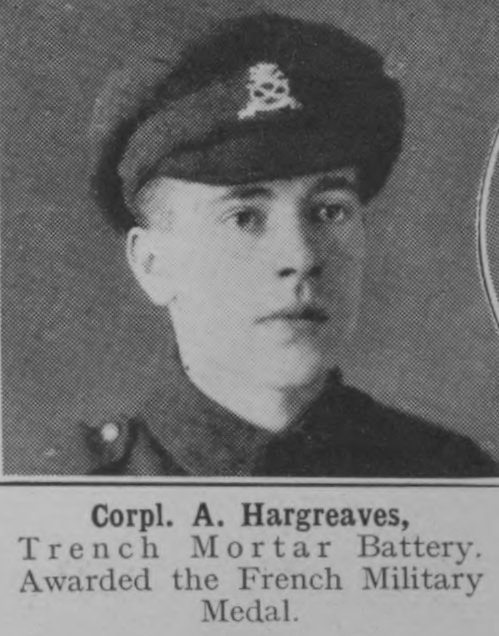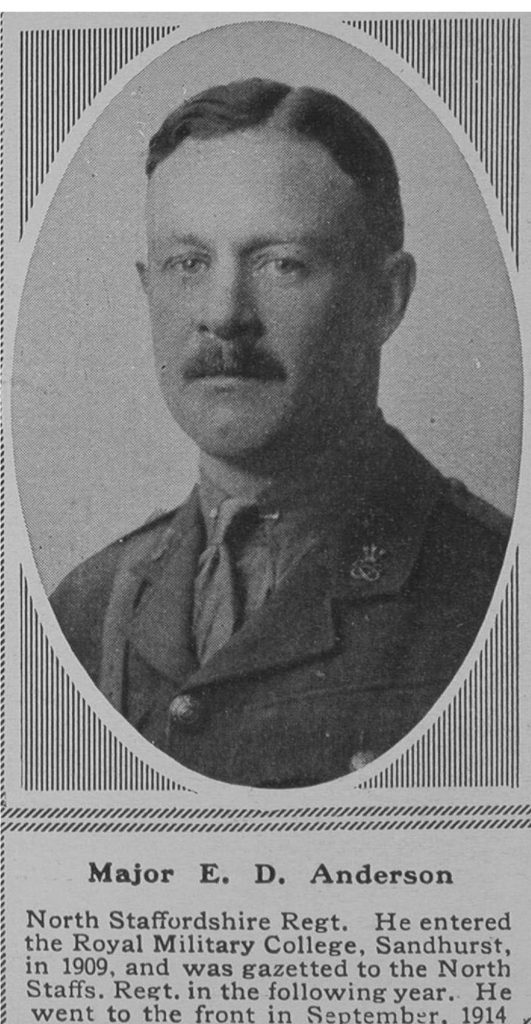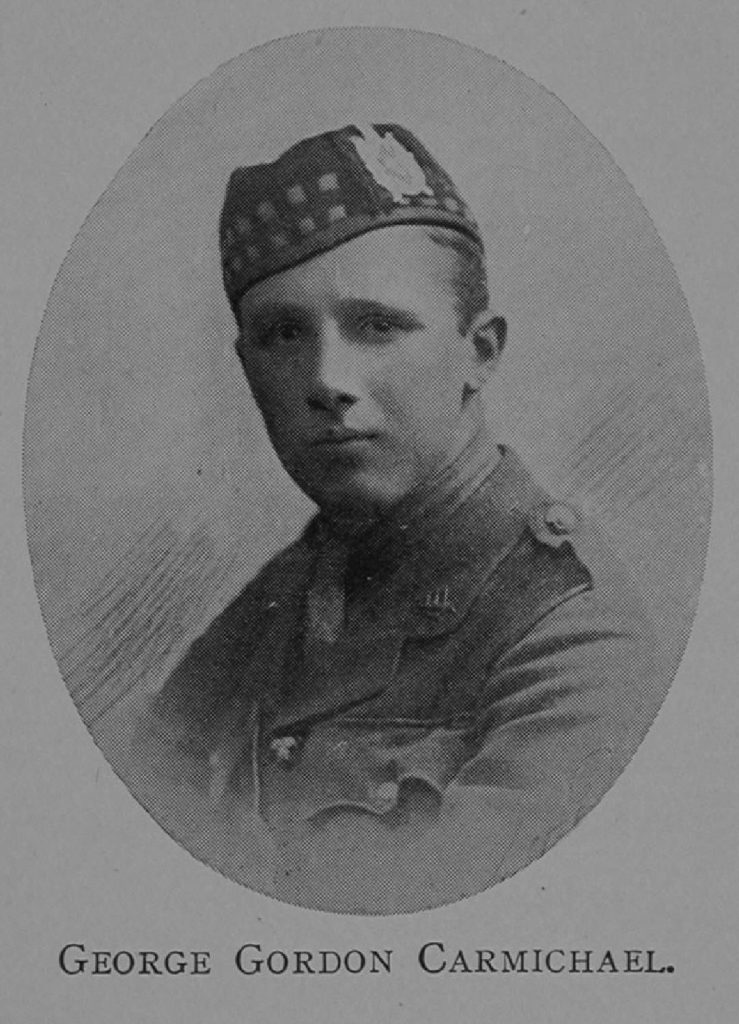LIEUTENANT-COLONEL J. W. SCOTT, D.S.O.
OXFORDSHIRE YEOMANRY (QUEEN’S OWN OXFORDSHIRE HUSSARS) AND 8TH (SERVICE) BATTALION PRINCE ALBERT’S (SOMERSET LIGHT INFANTRY)
JOHN WILLOUGHBY SCOTT was the youngest son of Sir John Scott, K.C.M.G., D.C.L., Judge of the High Court, Bombay, and Deputy Judge-Advocate-General, and of Leonora, daughter of Frederick Hill, Secretary to the General Post Office.
He entered the School in 1893 and left in 1895, when he passed into the R.M.A., Woolwich, being gazetted to the Royal Artillery in 1897. He served in the Boer War in the 55th Battery, R.F.A., receiving the Queen’s Medal with three Clasps and the King’s with two and being mentioned in Despatches. In 1908 he retired from the Army as Captain, and was called to the Bar at the Inner Temple in 1912.
When War broke out he was Captain in the Oxfordshire Hussars, and he went to the Front with that Regiment in September, 1914, being promoted Major in November. He was gazetted Lieutenant-Colonel in the Somerset Light Infantry in January, 1916, and in July of the same year he was wounded in the Battle of the Somme and invalided home. He returned to the Front in October, 1916, and was killed while leading an attack near Arras on April 23rd, 1917. Age 38.
He was three times mentioned in Despatches “for gallant and distinguished service in the Field,” and was awarded the D.S.O. on January 1st, 1917.
The following is taken from a letter from the Brigadier-General Commanding the 63rd Infantry Brigade :-
“For well over a year Colonel Scott and I were in practically daily contact. I formed a very high opinion of him in the early days of our acquaintance, and, as I got to know him better and saw more of his work, my admiration for him, both as a soldier and as a man, became great. I wrote to him on the day I left the Brigade, and told him I was certain no Brigadier had ever been better served by a Battalion Commander. A splendid soldier, he was most careful of the men under him, and they all knew it and were ready to do anything he told them.”
His Second in Command wrote:-
“It is with the deepest grief I write to tell you of Colonel Scott’s death. He died bravely leading the attack on the 23rd, shot through the head and killed instantaneously. I have been for nearly six months his Second in Command, and, although during the recent fighting I was commandin another Regiment in this Brigade, he fell near me leading his men like a gallant and devoted Officer. We all loved him in the Regiment, and looked forward to seeing him made a Brigadier, which he ought to have been made before this. I have seldom met a keener, more energetic and more capable man: a brave, gallant soldier, a good companion and true friend, we miss him frightfully; nothing so far has upset me so much during this war.”
The Adjutant of the Battalion, who was standing next to Colonel Scott when he was killed, described the circumstances of his death:-
“We took part in a big attack last Monday, the 23rd; we started at 4.45 a.m., and our Battalion was in support of the 4th Middlesex. At the start the attack went off fairly well, although the Germans had quite a lot of artillery opposite us, and the barrage was accurate. We were held up by machine-guns before reaching the road running between Roeux and Gavrelle, and we were in shell holes all the morning till about 1 p.m., by which time the strong point which had held us up was cleared of all the Germans in it. We then advanced about 300 yards and were preparing to push on to what is called Greenland Hill. We then used our glasses standing up in a shell hole, and the Colonel was killed instantaneously by a sniper.”
Another Officer wrote:-
“The Battalion has lost what it can never replace. Every Officer except one of those who went into action has been wounded or killed; of the men only 20 were marched out of action by me, though stragglers bring up the number to about 70. This April we have fought three actions, and the C.O. was covered with praise and congratulations. He would shortly have become a Brigadier-General, and a big honour was, I believe, on the way for him. He died in the high hour of success at the head of his men in the middle of the greatest battle the world has ever seen, and in him we have lost him, the best C.O. the Battalion has ever had.” The Sergeant-Major of the Oxfordshire Hussars, who had also been Sergeant-Major of the 55th Battery, R.F.A., wrote :-
“I met a boy of the 8th Somersets in hospital in France, who, when he saw my cap-badge, called out to me, ‘You belong to the same Regiment as my Colonel: do you know him?’ I said ‘ Yes, boy, do you ?’ His answer was ‘Yes, I know him to be one of the finest men that ever lived.”
That boy only told me what every man of the Oxford Hussars says to-day, whenever he is mentioned, and it is always a proud moment for me, when I think that I was that man’s Sergeant-Major, when he was a boy Officer.” He married on January 1oth, 1916, Madeline Ethel, eldest daughter of the Reverend Edward Worsley, Honorary Canon of Peterborough and Vicar of Evenley, Northamptonshire.
Source : Memorials of Rugbeians Who Fell in the Great War 1914-1918 Vol 4
